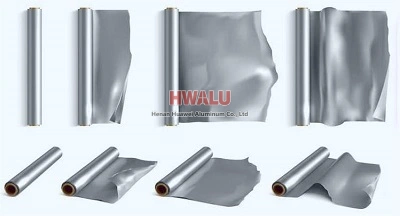What is aluminum foil for pill packaging Aluminum foil for pill packaging is a kind of aluminum foil used for pharmaceutical packaging. This aluminum foil is usually very thin and has properties such as waterproof, anti-oxidation and anti-light, which can effectively protect the pills from external influences such as moisture, oxygen and light. Aluminum foil for pill packaging usually has the following advantage ...
What is aluminum foil for composite foil Aluminum foil for composite foil is an aluminum foil product used to make composite materials. Laminated foils usually consist of two or more layers of films of different materials, at least one of which is aluminum foil. These films can be bonded together using heat and pressure to form composites with multiple functions. Advantages of aluminum foil for composite foil ...
What is Thin Aluminum Foil? Thin aluminum foil is a very thin aluminum material, usually between 0.006mm and 0.2mm. Thin aluminum foil can be manufactured through a process of rolling and stretching, which allows it to be very thin without sacrificing strength and durability. It also has some other advantages such as high electrical conductivity, thermal insulation, corrosion resistance, easy cleaning, etc. ...
what is 1145 alloy aluminum foil? 1145 alloy aluminum foil and its sister alloy 1235 have a minimum aluminum content of 99.45%, and the chemical and physical properties are almost the same. Occasionally, some production batches can be double-certified for 1145 and 1235 alloys. Like 1100 aluminum alloys, both are considered commercially pure alloys with excellent formability. Due to the high aluminum content, ...
What is aluminum foil for wine Aluminum foil for wine has excellent properties such as moisture-proof, anti-oxidation, heat insulation, and odor insulation, which can protect the quality and taste of wine products. In wine packaging, common aluminum foil materials include aluminized polyester film, aluminized polyamide film, etc. Aluminum foil for wine usually has a certain thickness and strength, which ca ...
Aluminum foil is typically thinner than aluminum coil. Aluminum foil is typically available in various thicknesses, ranging from as thin as 0.005 mm (5 microns) up to 0.2 mm (200 microns). The most commonly used thicknesses for household aluminum foil are around 0.016 mm (16 microns) to 0.024 mm (24 microns). It is commonly used for packaging, cooking, and other household purposes. On the other hand, alumin ...
What is aluminum-free deodorant? Aluminum-free deodorant is a cosmetic or daily necessities that uses natural plant extracts, essential oils and other ingredients to suppress and eliminate body odor. Its distinctive feature is that it does not contain chemical ingredients harmful to the human body such as aluminum salts. Mainly achieve deodorizing effect through other natural or safe ingredients Do aluminum-f ...
Aluminum foil lunch box is not a new thing, but it is really the last two or three years is particularly active. In particular, the hot sealing aluminum foil lunch box, because it is the first sealed food and then high-temperature cooking disinfection, in the consumer to open the taste before the maximum ensure food safety and health, full tightness, and high barrier can also be a good lock food flavor. Even i ...
Aluminum foil is recyclable. Due to the high purity of aluminum foil materials, they can be reprocessed into various aluminum products after recycling, such as food packaging, construction materials, etc. Recycling aluminum, meanwhile, is an energy-saving process that involves melting down aluminum scrap to create new aluminum products. Compared to producing aluminum from raw materials, the recycling process of a ...
Aluminum foil is a good packaging material and can be used for food packaging and pharmaceutical packaging. It can also be used as a conductive material. As a conductive material, aluminum foil has many advantages compared with other metals. What is the difference in conductivity between aluminum foil and other metals? This article will describe how aluminum foil conducts electricity compared to other metals. ...
1. Wide moisture-proof waterproof: Aluminum foil tape has the performance of moisture-proof, waterproof, oxidation, etc., which can effectively protect the adhesive items and prevent them from being eroded by moisture and water vapor. 2. Innidity insulation: Aluminum foil tape has good thermal insulation performance, can effectively prevent heat transmission and is suitable for thermal insulation of pipelines, ...










